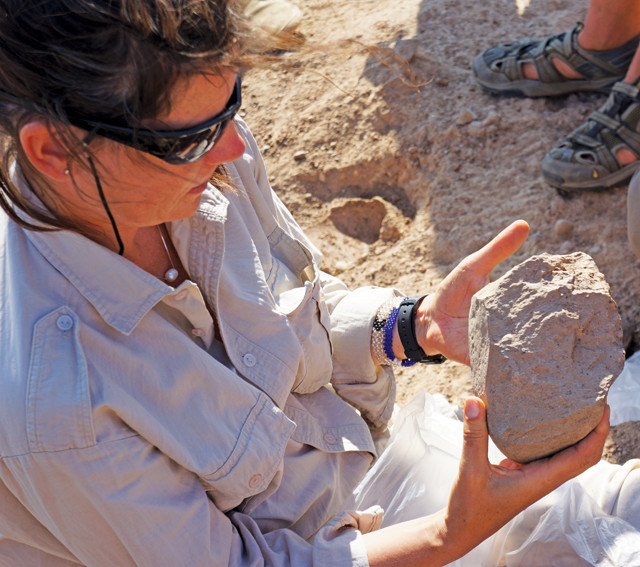
by Mary Caperton Morton Monday, August 24, 2015

Sonia Harmand examines a primitive stone tool found in Kenya. Credit: MPK-West Turkana Archaeological Project.
Tool making is thought to be one of the defining characteristics of the transition from apes to early man. Now, the discovery of a set of stone tools dating to 3.3 million years ago is pushing back this critical stage of early human development by more than half a million years, and, according to one researcher involved, disproving “the long-standing assumption that Homo habilis was the first tool maker.”
Found at the Lomekwi-3 site near Lake Turkana in Kenya, the tools include anvils, hammer stones, worked cobbles and cores for making sharp edges; they are more primitive than Oldowan tools, which date to about 2.6 million years ago. The shapes of and wear patterns on the tools suggest they were used for pounding and producing sharp flakes for cutting instruments, and indicate that their makers had a strong grip and good motor control. But, the arm and hand motions likely used to wield the tools were more similar to those demonstrated by modern primates when cracking nuts against rocks, wrote Sonia Harmand of Stony Brook University in New York and her colleagues in a new study in Nature.
The artifacts predate the known origins of Homo, although it remains to be determined what hominin species made them. The tools could represent a technological transition from more primitive, pounding tools to the more precise Oldowan tools, the authors wrote. They may also “shed light on an unexpected and previously unknown period of hominin behavior, and can tell us a lot about cognitive development in our ancestors that we can’t understand from fossils alone,” Harmand said in a statement.
© 2008-2021. All rights reserved. Any copying, redistribution or retransmission of any of the contents of this service without the expressed written permission of the American Geosciences Institute is expressly prohibited. Click here for all copyright requests.